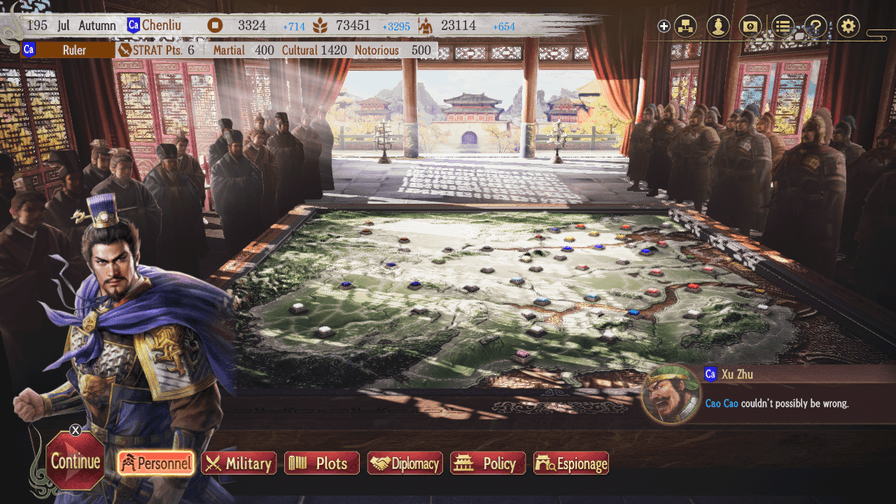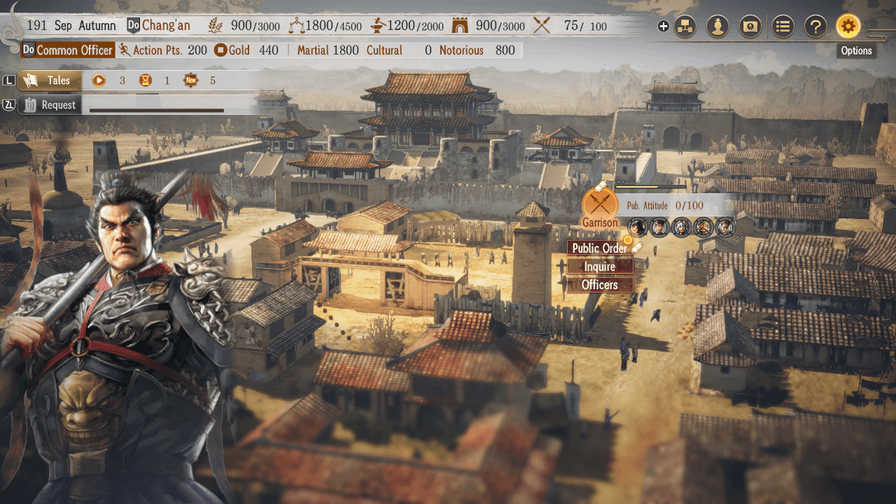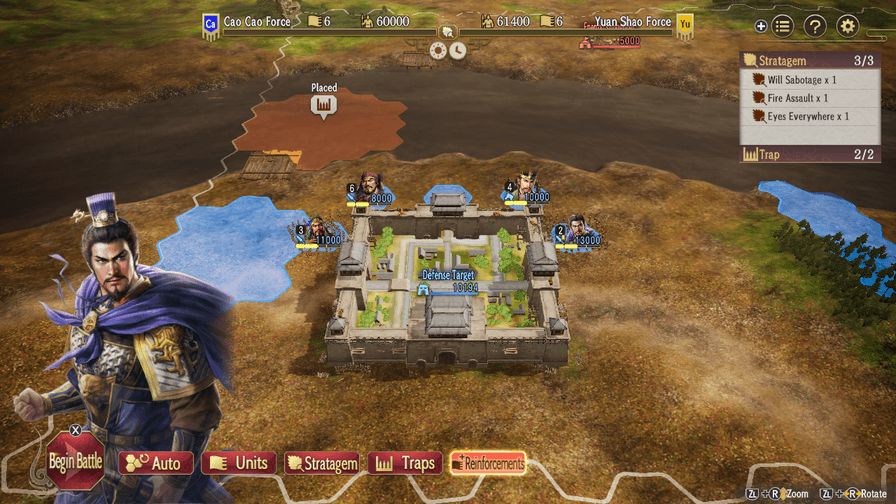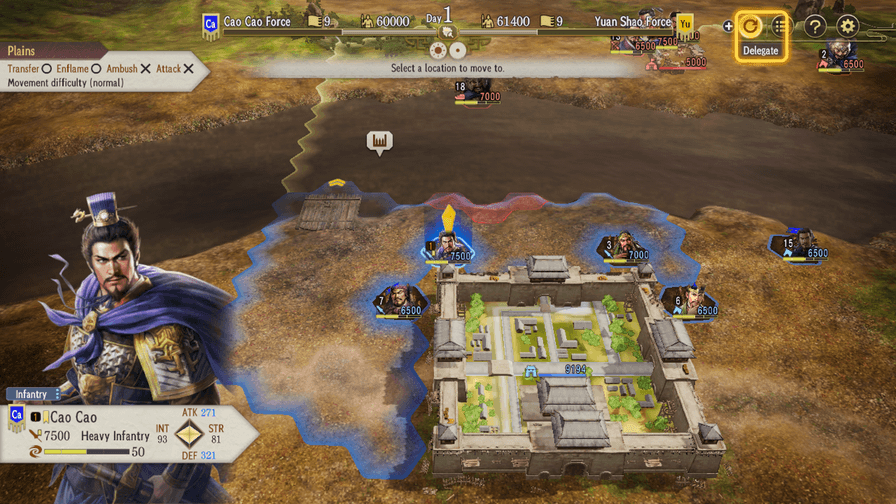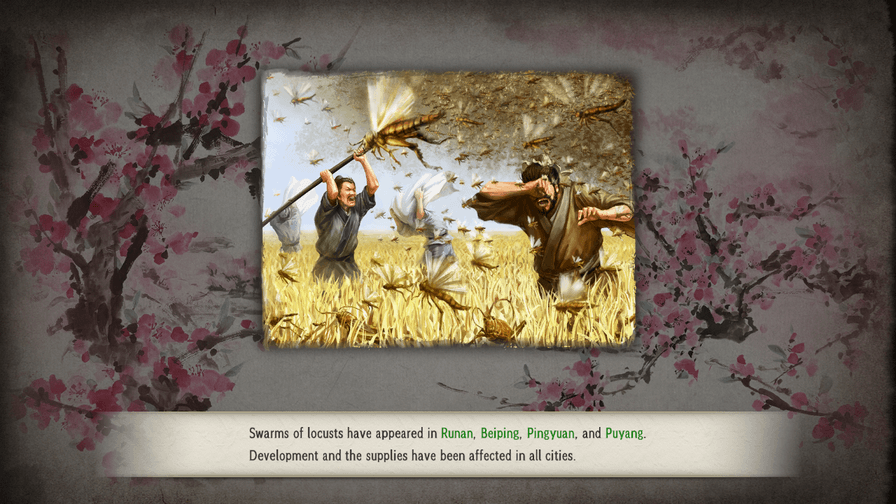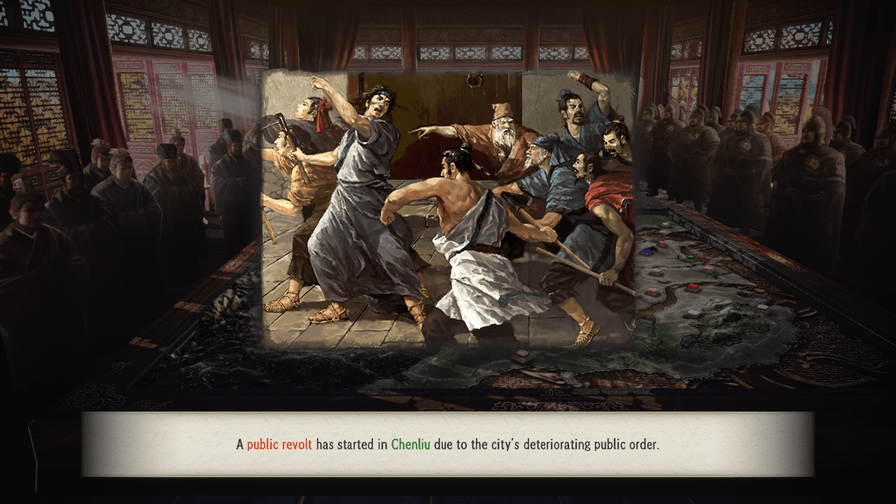Annual Overview
In cities, each turn (a chance for the protagonist to take action) comprises a single month.
The season changes every three months, and a parliament (a chance for forces to take action) is held at the beginning of each season. If the decision to march is made during a parliament session, a war council will be held and then battle begins.
Seasonal Changes
Parliament
-
Strategy


-
Battles
Mission
Cities
- Action
(1st Month) - Rest

- Action
(2nd Month) - Rest

- Action
(3rd Month)
Next Season Begins
Parliament
Held in January, April, July, and October of each year.
After deciding on strategies for your force, divisions, and cities, you will choose officers to take on missions. Officers that have been assigned a mission will carry it out in the city.
Note: Members of vagrant armies do not undertake missions, and free officers do not participate in parliaments.
Cities
City facilities are where you can complete missions, make inquiries, and build your relationships with other officers.
You will be able to perform actions until you run out of Action Points.
Resting will advance time to the next month.
War Council
A war council will be held if you decide during parliament to march to battle or order the officers under your command to march.
During war councils, you will select stratagems and unit positions, as well as set traps (if you are the defending side).
Once you select "Begin Battle," the battle will begin.
Battles
During a battle, each unit gets one turn per day.
You can move your unit, attack, and use tactics.
When the battle is over, you will return to parliament.
Disasters and Public Sentiment
Disasters
Disasters may occur at the start of every season.
You can adjust the frequency at which they occur in the Disasters section of the scenario settings.
| Locusts | Begin in January and may move to a neighboring city at the start of the next season. Will die out by October. Affected cities have reduced development and supplies. |
|---|---|
| Typhoon | Occurs in April. Affected cities have reduced development and defense. |
| Flooding | May occur in a city affected by a typhoon. Affected cities have reduced development and defense. |
| Plague | More likely to occur in a flooded city and may spread to adjacent cities at the turn of the season. Will eventually end in January. Affected cities lose troops, and the health of officers stationed there may deteriorate. |
| Blizzard | Affected cities have reduced commerce. |
Public Sentiment
When public order declines, public sentiment changes, and various restrictions are imposed.
Public unrest and public revolts can occur, resulting in a loss of soldier income, the inability to conscript troops, and other detrimental effects.
Public order cannot be improved while a revolt is ongoing. You will need to wait for the revolt to end before using public order actions.
| Public Unrest (Occurs when public order drops below 50) |
· Decrease in effectiveness of public order actions · Decrease in the number of soldiers that can be conscripted · Loss of soldier income · Increase in number of days required for reinforcements to arrive |
|---|---|
| Public Revolt (Occurs when public order drops below 25) |
· Public order actions unavailable · Conscription unavailable · Loss of soldier income · Further increase in number of days required for reinforcements to arrive |
Gold and Supplies
Increasing Gold
Every season, you will receive gold income from cities you control.
You can increase a city's gold by selling supplies through trade during a parliament. Gold is consumed by officers' stipends and by performing actions.
Gold income can be increased in the following ways:
- · Improving the city's commerce
- · Improving the city's public order
Increasing Supplies
Every July, you will receive supply income from cities you control.
You can also purchase additional supplies through trade during a parliament.
Supply income can be increased in the following ways:
- · Improving the city's development
- · Improving the city's public order
Troops
The number of soldiers stationed in a city will increase naturally every season.
Soldier income is larger in big cities, in cities with high public order, and in proportion to the governor's LEA and CHA.
You can also choose to perform conscription during parliament to gather more soldiers instantly.
Maximum Troops
There is a limit to the number of troops that can be stationed in a single city.
This limit can be increased by increasing the city's supply income.
It is also possible to temporarily exceed the limit by transporting troops from other cities.
Factors that Limit Troop Increase
During times of public unrest, the number of soldiers that can be conscripted will be reduced, and you will not receive soldier income.
During a public revolt, conscription will not be possible, and you will also not receive soldier income.
Supply Consumption
Troops in a city consume city supplies every July. The amount consumed depends on the troop numbers.
Be careful not to have more troops stationed in a city than you can afford to feed.
Draft Population
The number of civilians that can be drafted as troops in each city is known as its draft population.
A portion of the draft population will become soldiers if you conscript or recruit more troops.
If a city's draft population is too low, you will be unable to conscript or recruit any more soldiers.
The draft population of a city increases by a small amount each season.
Cities with high public order will see a greater increase in numbers.
